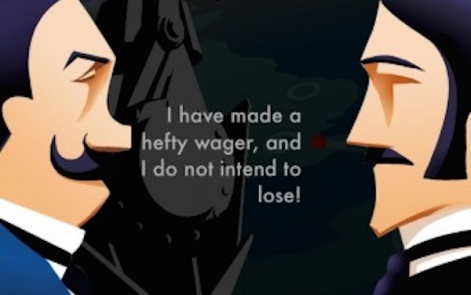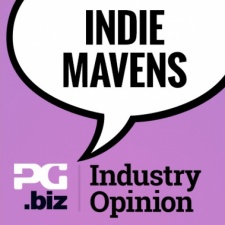After releasing his game Gratuitous Space Battles 2 on Steam and doing his usual round of marketing, game developer Cliff Harris hoped that the quality of the strategy game sequel would be enough to gain it attention.
At least, that's what had happened in the past
So he was dismayed to find it isn't now the case.
Harris then wrote an article in which he listed a number of significant changes that he had observed made having a successul game in 2013 easier than it is in 2015.
His first point contained the following:
- "Just being a good, quality game isn’t going to cut it any more. Unless your game has a famous actor in it, or is hilariously weird in its premise, or has some other non-game related ‘hook’ for the press to get excited about it, you can forget it. I hate worrying about all that. I’m a coder at heart, and this is meaning its getting tougher for me."
We carried this idea of it being harder to market your game now than ever before to our Indie Mavens in order to see what they made of it.
We asked them:
"Do you agree with Cliff Harris's notion that for a game to get attention from the press it needs a brand, or 'non-game related hook' or to be 'hilariously weird'?
Additionally, what advice do you have for attracting the press to your games?"
I know this is contentious, but... duh.
The fact of the matter is that many of the games that did well in the past would not have if they had some competition.
Some that did especially well had a story behind them that also bled into the creative process - people can tell a project that the creators cared about with a bit more of a genuine love and care and perhaps different taste than other creators.
Many of the games that did well in the past would not have if they had some competition.Shawn Allen
Yes, there is way more competition and store fronts are far more packed than they were before. It's frustrating to me as a guy who has yet to release a game for money thinking about how games can just vanish in the tidal wave of old PC releases and zombie roguelikes.
But that also means I need to make sure my game sticks out by working as hard as I can to infuse it with who I am, because no one can make my game.
As with any creative medium there has to be some hook. Fantasy/sci-fi games are a dime a dozen, your game needs something bigger than just being good. Especially to catch my eye - I've moved toward caring about the whole package in all of the media I enjoy these days.
I will use music as an example. There is a lot of rap out there, with kids on the streets slinging cds trying to make a few bucks one person at a time. There are also dozens of other ways to get your music out there through a lot of other storefronts.
The rapper Showyousuck caught my eye by tweeting at El-P asking him to come to a show in Brooklyn. Now, Showyousuck is a world touring rapper who has played sold out shows in Chicago, but when I saw him there were maybe 12 other people in the spot. He played a great set, and I loved every minute of it, despite being massively sleep deprived.
It's up to you to make it worth your audience's time and to stick out.Shawn Allen
The noise band that went on before him had more people. He has his brand where he focuses on pizza and pop culture instead of rims and violence and that gets him on podcasts. He is a Redbull Soundselect artist. Yet he has a job, he gives much of his music away for free, and you have to see his live performance for yourself. He's successful in his own right, and it's because people think he's interesting.
If Showyousuck didn't have a quirky name, didn't have his pizza branding, didn't stick to cool off-kilter fashion brands like MISHKA or rock polka dots every time he played, he'd be a person no one knew about, because he'd be like everyone else.
Making games is one thing, but being an artist, getting people to recognize who you are, what you are doing, why they should care about your game (especially if it looks like many that are already out there, like many do) takes work.
You are working in a world where generic vector art becomes a billion dollar franchise, and things that matter often sink. Just like every other creative form it's up to you to make it worth your audience's time and to stick out.
It is true that 'just having a good game doesn't cut it anymore' (not sure if that was ever really true), but you don't necessarily need a famous person, brand or weird premise either.
Marketing and communicating your game is a necessity and hard work. So your game and your PR/marketing both have to be good.
Having a nice hook helps make your PR easier, but it's not a magic potion either.
True. The game dev has become a game itself - a real-time strategy with constantly increasing difficulty and harder competition.
And although there is no universal recipe to get noticed, still you'll need a quality product to be able to return expenses.
Otherwise, even being noticed, you'll probably gain only a temporary attention "spike" that will quckly fall.
I disagree with the common premise of "before, it used to be all about your game's quality, not the stuff outside the game".
It always was about the stuff outside the game, maybe with few exceptions - the promotion of the game, the festival circuit, and getting the few actual voices with any sort of power to help your game become successful.
There's not a lot of mega-successful games that were seemingly out of nowhere surprise hits, I can think of two maybe.
Also remember: "A good, high quality game" a subjective thing. Unless it's really popular and successful, then the game is objectively good. Also if it wasn't successful, then it was objectively bad in hindsight.
I suggest putting 80% of your effort into promoting your game, maybe, MAYBE 15% into actually making the game.Kepa Auwae
If a game looks cool way before it comes out and before anyone can play it, it also means that it's a good game. This is just how people think, haha.
With this in mind, I suggest putting 80% of your effort into promoting your game, maybe, MAYBE 15% into actually making the game. The extra 5% of your efforts should go towards having nice hair in press/festival photos. I know I personally am bad about not devoting much time to promoting my games, and my hair isn't very good at all. I'm considering hiring a body double to pretend to be me, with nicer hair.
There was less competition before, but there was always competition. We just remember the massive success stories and forget everyone else.
And many of those winners hit every festival, made the right connections, were good at self promotion, thought a lot about how to sell the hooks of the game to the press, won the IGF for their game prototype years before their game was finished and released, and got press coverage based on their personalities outside of game development.
So when I hear "it used to be solely about the quality" I wonder what the hell people are talking about.

Heikki Repo is a Co-Founder and Creative Director of the game company Cornfox & Brothers Ltd. The company established in 2010 is best known for their adventure game Oceanhorn: Monster of Uncharted Seas (2013) and the Death Rally (2011, 2012).
Heikki enjoys plotting stories and making videogame art. He is a huge fan of storytelling and believes that every element of a videogame can be used to evoke emotions and deliver drama. Because of his non-stop creative nature, he works in many roles in game development.
Oh no. These days it is easier than ever to get attention to your game! But you will need to keep up with the times.
If you market your game with the same tricks you did 2-5 years ago, it doesn't cut it any more.
A good game is the principle of all success, that's where you start and then it is easier to get the attention of the press, streamers and players and most importantly - all of their friends when they share your game in all the channels of social media!
Trying not to sound like a prick, but as Shawn said, all of this is so duuuh.
If you release a game on Steam, there are more than half a dozen games also being released on Steam at the same time. If you release on mobile, there are hundreds of games being released at the same time.
It's not the media's responsibility to go hunting for your game, so getting angry at them is not the solution.Mike Rose
If you don't actually show people why your game is better/more interesting than any of the other games coming out that day/week/month, of course you're going to get lost. And it's not the media's responsibility to go hunting for your game either, so getting angry at them is not the solution.
The solution is to keep ahead of the curve and use the latest trends to your advantage. We've been building up our contacts and influence with Twitch and YouTubers, and we're currently exploring the eSports scene, working with video agencies... we're even exploring working with Viners, as crazy as that sounds.
I think all of this is why companies like ours - "indie publishers" as people as calling them - are popping up more and more. People want to make games, but they don't want to have to spend a ridiculous amount of time building up these contact lists and relationships.
We already have these relationships in place, so a developer working with us just immediately gets those benefits and can focus on the game again.
I'd agree that there are certain types of games that are more likely to get press attention than others.
As a developer of a sports title (Table Tennis Touch), we've found that it can be a struggle to get noticed by press who may think a table tennis game is not as exciting to write about as a game that has a unique mechanic, visual style or unusual premise. It can be frustrating but it is understandable.
That's why we've always pushed the quality of our visuals in our marketing (website, trailers, social media) to try and get noticed. And it was our game trailer that attracted the attention of Apple a few days before its iOS release.
Their 'Editor’s Choice' endorsement was certainly responsible for the game getting a lot more press coverage than it would have done otherwise. Without that trailer to get their attention, who knows what would have happened to the game.
Making a great game does not guarantee success - if that were the case, the game charts would be filled with 5 star games but we know that they’re definitely not.
I would disagree with the implication of Cliff’s article that a game being “good” could be fundamentally divorced from it featuring something interesting that jumps out to the press.
A “good game” inherently must come packaged with some kind of hook.Ian Sundstrom
Since I put a lot of emphasis on the novel and the original in my own games and when critiquing others, from my perspective I would say a “good game” inherently must come packaged with some kind of hook.
That isn’t necessarily a gimmick, or a celebrity guest appearance, but that should be a very clear definition of what justifies the game should exist amongst its peers.
This goes beyond its quality of execution - a reader of a press release should know right away what it is about the game that is unique.
As developers, this originality will be impossible to execute if we spend our time looking at what games already are - constantly rehashing traditions towards a preconceived notion of a “good game”.
We are more likely to succeed if we allow ourselves to look outside of games for inspiration and make never-before-rendered environments, mechanics that model fresh phenomena in novel ways, and original characters who aren’t stereotypical video game heroes.
As a lot of people have said I don't think Cliff's point is controversial. Discovery is getting very difficult and it's no surprise that more and more talk about marketing is dominating the discussion around indie game development.
The truth is that now the market is flooded.Richard Perrin
I feel like my first commercial game was lucky in that it got through Steam just before the floodgates opened and benefited hugely for it. At this point we're going to get more and more "marketing gurus" stepping up selling promises of the one true way to guarantee your game's a hit.
Personally I think the truth is that now the market is flooded we're all going to struggle to guarantee our new games will find an audience. It's frustrating but it puts us in the same position as most of other creative industry.
Either you've got a huge budget to market your game to death, or you've kind of got to roll the dice and hope what you're doing catches on with people.
I'm learning this these days, so it's not necessarily a sound point of view, but it seems there's a general tendancy of the press to pick up easy to access games. I suppose there's some influence from the YouTube-style reviewing process; WTF videos and other Let's Play where you relate your experience of discovering the first 15 minutes of a game without prior analysis.

It's difficult to blame the press for that, considering the huge amount of people making games out there and the pressure to deliver from everyone.
Also, surprise is something good game designers can build upon (I'm thinking Mc Pixel, Frog Fractions etc).
The only thing is many good games are not enjoyable in 10 minutes : could you really have enjoyed the scope of the original SimCity in a WTF video? Finding the right people to talk about your game is still the best strategy.

Jon's focus is on content, working from the initial outline, through the development of the authoring tools, to the writing and scripting of final content.
Previously, Jon was a lead designer at Sony Computer Entertainment Europe, and before that a secondary school teacher, so he loves to talk. He's a published author of short stories and over a decade's worth of award-winning interactive fiction.
The press is certainly overloaded with games they could write about, so it seems only natural that things won't bubble to the top unless there's something newsworthy about them: but that doesn't have to be a bad thing, does it?
A game can have an actor or a weirdness - but it can also have a political statement, an innovative mechanic, or just be executed exceptionally well.

80 Days got quite a bit of attention, for instance, but not for any of the reasons Cliff mentions. We like to think it was simply an interesting game to play.
It's a risky business, this making games thing, but we've got to make our products interesting and relevant, otherwise we shouldn't be surprised if they fail to get noticed. We're not just making games for ourselves, are we?
When I started out as an indie, the core piece of advice that was repeated to me was "focus on the game, make sure it is good". I still think that making good games is the foundation of any studio, but everything outside of the game makes a huge difference.
Now, when I look at a game we are developing, or trying to evaluate the potential of a game about to be released, the most important question that I try to answer is: "Why should people care?". This is a simple test: does the game have a hook? Is there something to draw people in?
Most of us here work on premium games which are sold for money. At the end of the day, the business transaction for that kind of game occurs before the game is even booted up.
The most important question that I try to answer is: "Why should people care?".Dan Menard
A mentor of mine put it this way: Figure out what you need to promise people in order for them to hit the BUY button (market validation), then ship the game that will deliver on that promise.
If your game is supremely marketed, but has lackluster quality, your players will feel burned and word will eventually get around. If you make a great game but there is no impulse for players to hit BUY, you will have a commercial flop.
Finding that hook is a real challenge, but luckily it can be done without spending any development dollars.
As for attracting the press, I think that is secondary. Emailing journalists to get coverage is much much easier if your game has a hook in it from the start.
If you are trying to promote another zombie survival game, good luck! Press are gamers too, and in the end they follow the games that attract and interest them. If you fine-tune that hook, the press will follow along with all your potential customers.































